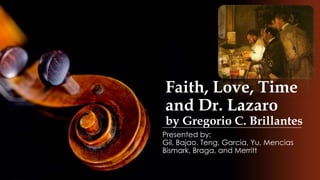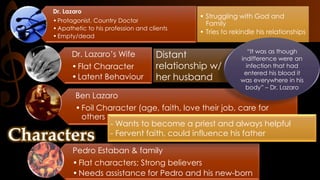Faith, love, time and dr
- 1. Faith, Love, Time and Dr. Lazaro by Gregorio C. Brillantes Presented by: Gil, Bajao, Teng, Garcia, Yu, Mencias Bismark, Braga, and Merritt
- 2. Plot Summary The main Plot is about a father who wants a son to be a doctor. His son (Ben) though wants to be in the service of God by becoming a priest. But Dr. Lazaro has lost his faith because of his profession. After the doctor witnesses his son baptize an ill child, Dr. Lazaro questions his lack of faith and looks up to God once again.
- 3. - Limited Third Person Point of View (Narrator not a character) - The events in the story seen only through Dr. Lazaro’s eyes - Readers are able to enter the mind of Dr. Lazaro; feeling what he feels - Narration: provides a less biased perspective; enlightening the readers - Openness to opinions and reflections
- 4. Setting and Atmosphere Story Portrays a location of a dreary ambience - A sense of Hopelessness The story was constantly set in darkness: - The story happened late at night, the light bulb under they leave in their house was dim, the road going to the gas station was dark, the way to Esteban's house was dark, and everything in the story was set in darkness. - In all of those dark places a source of light was present and those sources of light brought things into focus even for just a short amount of time. Context Clues: the view of the stars, highway lights, wide plains from veranda, and the phonograph; these suggest the 1980s to 2000s
- 5. Dr. Lazaro •Protagonist, Country Doctor •Apathetic to his profession and clients •Empty/dead Dr. Lazaro’s Wife •Flat Character •Latent Behaviour Ben Lazaro •Foil Character (age, faith, love their job, care for others Pedro Estaban & family •Flat characters; Strong believers •Needs assistance for Pedro and his new-born Distant relationship w/ her husband - Wants to become a priest and always helpful - Fervent faith, could influence his father • Struggling with God and Family • Tries to rekindle his relationships Characters “It was as though indifference were an infection that had entered his blood it was everywhere in his body” – Dr. Lazaro
- 6. Themes Dr. Lazaro doubted his faith because of certain events such as his son's death and the everyday happenings in his occupation. Doubts in your beliefs will rise when certain traumatic or important events happen in your life. These doubts are tests of conviction.
- 7. Symbol Scene wherein Dr. Lazaro and Ben were going back home after the baby died. Dr. Lazaro was following the dim light of the flashlight that Ben was holding.
- 8. • Duty had taken the place of an exhausted compassion” You should do what you love, and you should love what you do. • That is what work is all about. But for Dr. Lazaro, he feels as if his compassion for his work has all dried out. It is ironic how something you once loved and was compassionate about vanishes and slowly morphs into something you feel like you are obliged to do. •Religion is one of the factors of the downfall of Mr. Lazaro’s marriage, and religion is one factor how it got him quite closer to his son. •The death of Esteban’s son triggers the memories of his own son’s death. Irony
- 9. • At his old age, it is only now that Dr. Lazaro realizes this: “…for certain things, like love, there was only so much time”. •There is irony in the theme of life versus death as seen with Esteban’s son. Usually, in literature, babies represent the beginning of a new life. But Esteban’s baby dies. •Lazaro’s wife is very religious and their home is filled with religious paraphernalia, but Dr. Lazaro is extremely cynical towards religion and seems to doubt that there is a higher being living among us. E <3 N









